The birth
of the universe.
Evolution or creation ?
of the universe.
Evolution or creation ?
1 - Black holes and the birth of the universe : [In French]
2 - Science and the evolution of knowledge : [In French]
Stone worshippers :Remnants of these ancient beliefs can still be found today. In the Middle East, religion was polytheistic and varied from region to region: many divinities were identified with the sky, the stars, certain stones and trees, while djinns and spirits manifested themselves in animal form.
This is how a black stone located in the south-east corner of the Kaaba in the al-Haram mosque in Mecca (Saudi Arabia) came to be. According to tradition, this stone dates back to the time of Adam and Eve.

https://fr.wikipedia.org/wiki/Arabie_pr%C3%A9islamique
https://fr.wikipedia.org/wiki/Pierre_noire_(islam)
Energy :
From the ancient Greek enérgeia « force in action », its origins date back to the 15th century.
The cargo cult :
A particular cult arose in Melanesia after the Pacific War, when the local populations came into contact with armies with considerable equipment. Having noticed that the radio operators of the troops on the ground seemed to obtain the arrival of ships or the parachuting of food and medicine simply by asking for them on their radio transmitters, some natives had the idea of imitating them. To do this, they built fake radio operator booths so they could ask for what they needed. They even built airstrips, hoping that planes would unload their cargo there.


Peter Lawrence a écrit, en 1974, dans son livre intitulé Les Cultes du cargo (éditions Fayard) :
« The natives could not imagine the economic system that lay behind the bureaucratic routine and shop displays, and there was nothing to suggest that the whites made their own goods. You couldn't see them working metal or making clothes, and the natives couldn't guess at the industrial processes used to manufacture these products. All they could see was the arrival of ships and planes. »
https://fr.wikipedia.org/wiki/Culte_du_cargo
Analogy :
Analogy is a thought process by which we notice a similarity of form between two things of a different nature. In discourse, an explicit analogy is a comparison, while an implicit analogy is a metaphor. A comparison between two winding roads is not an analogy, because they are two objects of the same type: it is a simple resemblance.
 |
 |
On the other hand, to say that a road meanders is an analogy : here we identify the similarity between two things of different types.
 |
 |
Rational thinking :
Unlike instinctive thinking, which responds to personal needs, rational thinking is influenced by life in society, which requires us to give up, more or less, what we want, in order to act in accordance with the group.
Birth of monotheism.
El :
The religion of Ugarit is commonly referred to as Canaanite.
El is the kingdom's greatest deity, the creator of humanity, who is called ‘adm’ in the Ugaritic language.
The pantheon of gods has a pyramidal structure:
- At the top is El accompanied by his wife or paraedra(*) Asherah.
- Below him are the 60 ‘divine children’, including Baal, the god of storms, and Yam (YW, Yaw), the god of rivers and seas.
- Then come Kothar wa-Hasis, the “butler” of the divine family, and the servants of the divine family (in Hebrew: malakhim), whom the Bible calls ‘angels’ (i.e. “messengers of the gods”)..
(*) Paraedra : divinity associated, in a subordinate rank, with the cult and functions of another divinity.
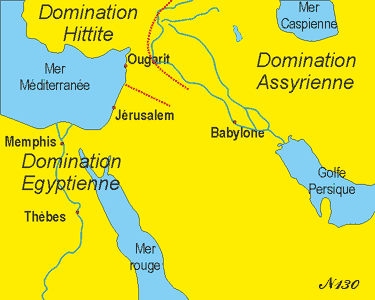
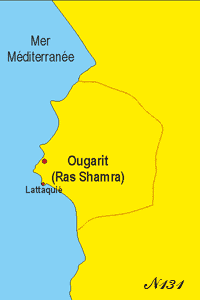
The Bible contains references to El, the God honored by secrifices, generally translated as “God” or “The Lord”.
Genesis 22 : 1 After these things, God (translation of Elohim) tested Abraham, and said to him: Abraham! And he said: Here I am ! 2 God said, "Take your son, your only son, the one you love, Isaac, and go to the land of Moriah, and offer him there as a burnt offering on one of the mountains I will tell you. |
The history and religion of Ugarit :
The history of Ugarit dates back to the Neolithic period, around 6000 BC. The best-known period, as revealed by archaeological excavations, is between 1500 and 1200 BC.
Tablets unearthed at the site show that Ugarit and Israel share a common literary and linguistic heritage.
Two periods can be distinguished.
Prior to archaeological research in the 20th century, a literal interpretation of biblical texts was the rule. It was generally accepted that the writings of the Bible reliably described the origins of Judaism.
Then, thanks to discoveries at Ugarit, one of the origins of the texts was revealed, which would be taken up again, almost a millennium later, during the Judean exile to Babylon.
Voir : https://fr.wikipedia.org/wiki/Religion_ougaritique
https://fr.wikipedia.org/wiki/Ougarit
Child :
We are all familiar with the negative view of children held by the writers of the Book [cf : the place of children in the Bible]. Fortunately, this view evolved over the centuries, thanks to great prophets and philosophers.
The same was true for the woman.Abraham : (Genesis 22)
11 Then the angel of the Lord called to him from heaven, and said, "Abraham! Abraham! And he said, “Here I am !”
12 And the angel said, “Do not put your hand on the child or do anything to him, for now I know that you fear God and have not withheld your only son from me” (withheld from God or the angel ?)
13 And Abraham looked up and saw behind him a ram held up by its horns in a bush; and Abraham went and took the ram and offered it as a burnt offering in place of his son
Jesus : (Matthew 19:14 Mark 10:14)
And Jesus said : Let the little children come to me, and do not hinder them; for the kingdom of heaven is for those who are like them.
Assyria is a land of silt :The adulteress : (Jean 8,1-11)
1 - Jesus went to the Mount of Olives.
2 - But in the morning he returned to the temple, and all the people came to him. He sat down and began to teach them.
3 - Then the lawyers and Pharisees brought a woman caught committing adultery. They placed her in the middle of the crowd
4 - and said to Jesus: "Master, this woman was caught in the act of adultery.
5 - Moses, in the law, commanded us to stone such women. What are you saying?"
6 - They said this to set a trap for him, so that they could accuse him.
But Jesus stooped down and began to write with his finger on the ground.
7 - As they continued to question him, he straightened up and said to them, “Let him among you who is without sin cast the stone against her first.”
Muhammad ; (Sura 4).
« To men goes a share of what is left by father and mother and relatives; and to women a share of what is left by father and mother and relatives, whether a little or a lot: a fixed share. »
« O believers! It is not lawful for you to inherit from women against their will. Do not prevent them from remarrying in order to take from them a part of what you had given, unless they come to commit a proven sin. And behave properly towards them. If you have an aversion to them during life together, it may be that you have an aversion to something in which Allah has deposited great good. »
Babylonia and Chaldea lie on a plain formed entirely by the alluvial deposits of the Tigris and Euphrates rivers. Every spring, the floods of the two rivers inundate the lowlands, depositing fertilizing silt
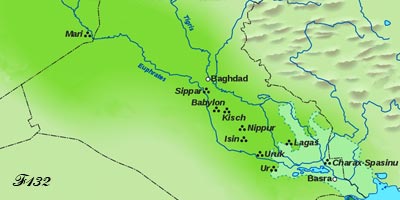
Alluvial plain of Mesopotamia.
https://books.openedition.org/enseditions/5235?lang=fr
http://www.mediterranee-antique.fr/Auteurs/Fichiers/JKL/Lenormant/Histoire_Orient/T_4/HAO_41.htm
Creationism :
Religious doctrine according to which one or more higher beings are the creators of life. Born in the 19th century as a reaction against Darwinism, it is opposed to the principle of evolution based on natural selection.
This doctrine is represented by a wide range of currents, from those supporting fixism (“Young Earth” and “Old Earth” creationism) to those embracing transformist theory (the intelligent design and directed panspermia hypotheses).
Young Earth creationism is the strictest form of creationism. It interprets the Bible as a book of natural science and history, and adheres to the belief that the account of the creation of the universe (Genesis) gives an accurate description of the origin of the Universe
Since these texts were “dictated by God”, they cannot be disputed. Thus, the heavens and the Earth were created on October 23, 40041, Adam and Eve really did live in the Garden of Eden, and the fossils found are objects created as such, either by God as sketches or to test the faith of human beings, or by the Devil to deceive them.
This school of thought rejects any idea of evolution, biological or geological.
For its part, Old Earth creationism accepts the advanced age of the Earth. However, the Big Bang event is said to have been authored by God.
Panspermia is a hypothesis according to which the origin of life on Earth is due to extraterrestrial seeding (contribution of essential elements by comets).
Directed panspermia is the theory that the origin of life on Earth is due to deliberate extraterrestrial seeding.
Intelligent design is a theory that claims to be scientific. It holds that “certain observations of the Universe and the living world are better explained by an ‘intelligent’ cause than by random processes such as natural selection.”
Intelligent design applies only to the field of biology, and does not deal with the origin of the Universe.
https://fr.wikipedia.org/wiki/Cr%C3%A9ationnisme
https://fr.wikipedia.org/wiki/Cr%C3%A9ationnisme_Jeune-Terre
https://fr.wikipedia.org/wiki/Cr%C3%A9ationnisme_Vieille-Terre
https://fr.wikipedia.org/wiki/Panspermie
https://fr.wikipedia.org/wiki/Dessein_intelligent
Voir aussi : https://lejournal.cnrs.fr/articles/charles-darwin-de-lorigine-dune-theorie
http://www.cnrs.fr/cw/dossiers/dosevol/decouv/articles/chap1/lecointre1.html
Évolution et créationnismes, sur le site du CNRS
From the creation of the world to the creation of the human being in Babylon :
Mesopotamian myths that deal with the birth of the universe do so on several occasions through an account of the separation of Heaven and Earth.
In a region where women enjoy a privileged status, it was Nammu, the primordial goddess of Sumerian mythology, who gave birth to An (Heaven) and Ki (Earth).
The first attempt to explain the creation of man is found in a Mesopotamian work, the Poem of Atrahasis (circa 1700 BC): man is made by Ea (Enki), from clay and the blood of a sacrificed minor god. This creation had become necessary, as the gods had become too numerous and needed servants.
The god Ea possesses wisdom and mastery of the arts and techniques, making him a true demiurge (creator).
In the Epic of Gilgamesh, the creation of Enkidu meets another need, that of moderating Gilgamesh. We also find in this text the expression “to become clay again”, which means to die.
When Enlil, deity of the wind, unleashes the Flood to exterminate humans, it is Ea who comes to the aid of the Mesopotamian “Noah”, warning him of the impending disaster and showing him how to save living beings.
This origin of man from clay is to be found in all subsequent texts:
- Genesis, where God creates Adam in his own image, from clay animated by his breath,
- the Koran, where man is formed by Allah from clay into which he breathes his spirit,
- the Metamorphoses, where Ovid assumes that man was formed by Prometheus from earth mixed with water.
https://fr.wikipedia.org/wiki/Mythologie_m%C3%A9sopotamienne#La_cr%C3%A9ation_du_monde
http://crdp.ac-paris.fr/parcours/fondateurs/index.php/category/gilgamesh?paged=2 (Centre régional de documentation pédagogique)
https://fr.wikipedia.org/wiki/Ea_(divinit%C3%A9)
Albert Einstein :
A German-born theoretical physicist, he published the theory of special relativity in 1905 and the theory of gravitation, known as general relativity, in 1915. His work contributed to the development of quantum mechanics and cosmology. He was awarded the 1921 Nobel Prize in Physics for his explanation of the photoelectric effect.
Today, he is considered one of the greatest scientists of all time, and his work is widely known thanks to the equation E=mc2, which establishes an equivalence between matter and energy in a system.
Epigenetics :
While genetics concerns the study of genes, epigenetics is concerned with the information that defines how these genes are used by a cell. In this way, certain sequences are shifted to enable cells or organisms to adapt to environmental changes.
Immune system :
The physiology of plants shows that an elaborate immune system is not necessary to protect them against aggression from the outside environment: chemical components (pyrethrum, for example) are quite sufficient.
The immune system has two complementary functions:
- to target foreign agents that may have penetrated the organism (the role of an army providing protection against external aggression),
- to eradicate the very cells of the organism which, by developing anarchically (cancer cells), can endanger life (the role of a police force ensuring order within borders).
Perspective :
Le Robert dictionary : the art of representing objects on a flat surface, in such a way that their representation coincides with the visual perception one can have of them, given their position in space in relation to the observer's eye.
Molecular agitation :
Brownian motion describes the random movement of a particle immersed in a fluid and subjected to the shocks created by the molecules of this fluid. The result is a highly irregular motion of the particle, first described in 1827 by botanist Robert Brown.
Water molecules, in perpetual motion, travel an average of 0.6 mm per minute.
https://fr.wikipedia.org/wiki/Mouvement_brownien
Yam and Ashera :
The Mesopotamian myths (3000 BC) contain most of the texts taken up by the Judeans during their exile in Babylon (600 BC).
For example, in the epic of Atrahasis and Gilgamesh, written at this time, we find a story similar to that of the Garden of Eden, as well as a variant of the Flood myth.
Similarly, the myth of Adapa is said to be the origin of the temptation by the serpent in the myth of Adam and Eve.
At the same time, we find the god Yam (or Yaw, Yammu, Yamm), god of chaos (*) and raging seas, mentioned in the writings of the ancient city of Ugarit.
Yam is often contrasted with Baal, the god of storms, whose name means ‘lord’. In Ugaritic, Baal is sometimes cited as ‘king of the heavens’ or ‘first son of El’.
(*) In Greek mythology, Chaos refers to infinite space before its transformation into an organised world.
Yah is the oldest form of the name Yahweh. It is found in the Hebrew Bible (26 occurrences when used alone, not counting compound uses). It is rarely used in Judaism, which favours Elohim, Adonai (lord), HaShem (the name) or YHWH..
The term Yah is translated differently in different Bibles :
Darby Bible Exodus 15:2https://fr.m.wikipedia.org/wiki/Origines_du_juda%C3%AFsme
Jah is my strength and my song, and he has been my salvation.
TOB Bible
The Lord is my strength and my song. He is my salvation.
The Jerusalem Bible
Jah is my strength
Louis Segond Bible
The Lord is my strength
Martin Bible
The Lord is my strength
https://fr.wikipedia.org/wiki/Yam
Monotheisms in the Middle East.
(XIVème siècle avant notre ère).1 - The cults involved :
a – The cult of Aten in Egypt : 14th century BC.
The cult of Aten was developed by pharaohs Thutmose IV and Amenhotep III, but it was the latter's son, Amenhotep IV, who made the personification of the solar disc, Aten, the sole god of Egypt.
Amenhotep IV then took the name Akhenaten, which means ‘he who is useful to Aten’. He built and dedicated a new capital to him: Akhetaten, ‘the Horizon of Aten’, (today Tell el-Amarna).
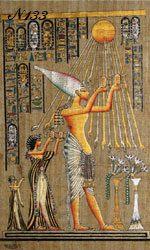
b – Cult of El in Ugarit : From the 15th to the 13th century BC.
In the kingdom of Ugarit, the god who occupies the position of dominant divinity in religious texts is El, whose name literally means « God ».
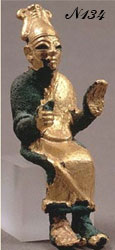
c – Cult of Mazda in Persia : 1st millennium BC.
Zoroastrianism is a monotheistic religion of ancient Persia. It is the result of an adaptation of Mazdaism during the 1st millennium BC, and takes its name from its founder Zarathustra (Zoroaster for the Greeks).
The main effect of Zarathustra's religious reform was to steer the Mazdean religion towards monotheism, with a major god, Ahura Mazdâ (the Wise Lord), surrounded by a number of deities. By creating heaven and earth, Ahura Mazda put an end to the initial chaos.
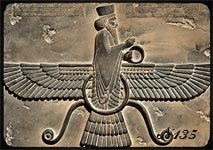
Zarathustra also condemned the traditional rites and sacrifices offered to the gods by the Persians. Considering that in every human being there are two tendencies, one towards good and the other towards evil, he suggested that we should always choose the side of good.
The Zoroastrians considered that their god needed neither adoration nor intermediaries.
2 - The convergence of the great religions :
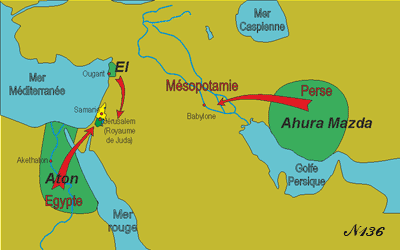
Prelude to monotheism, the major gods.
How did these religions, which were tending towards a sovereign god, lead to the monotheism of today ?
As we can see, monotheism was born in a region where a multitude of divinities lived side by side. Yet one of them prevailed. Thomas Römer, a professor at the Collège de France and author of ‘La Bible, quelles histoires’ (Bayard) and ‘L'Invention du monothéisme’ (Seuil), has put forward an explanation. It's easy to see how the tribal god Yahweh was transformed into a universal God.
The single god we know today was born among the Hebrew people around the 6th-5th centuries BC.
It was in fact around 620 BC, in the kingdom of Judah, that the shift from polytheism to monolatry took place under the reign of King Josiah (-639-609) (see below *). Only the veneration of Yahweh became legitimate, even though a multitude of other gods existed, as archaeologists have been able to discover (see below **), and as many passages in the Book recognise (see below ***) : a dramatic event therefore had to occur for YHWH to surpass all the existing gods: the destruction of the temple and the exile.
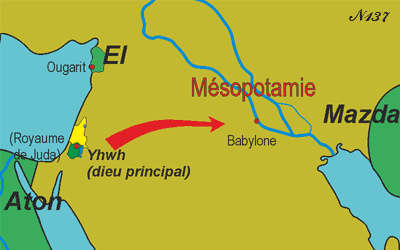
Yhwh, principal god.
-587 BC Exile to Babylon.
-587 BC Exile to Babylon.
In 587 BC, the kingdom of Judah was attacked by the troops of the Babylonian king Nebuchadnezzar II, and the temple in Jerusalem was destroyed. Josiah's successor was killed, while his son Joachin and the other notables and scholars of the kingdom were deported to Babylon.
The kingdom of Judah became a province of the Persian Empire, Yehud: Judea. Its inhabitants were henceforth called Yehudim, the Judeans, or Jews.
Having demonstrated his inability to protect his people, the god of the Hebrews could then have disappeared. Yet it was from this disaster that the monotheistic idea was born.
During their exile in Babylon, the scribes rewrote history, transforming the failure of their god into a formidable proof of his power: the people of Israel had not been annihilated by the armies of the conquerors, it was Yahweh himself who had brought the Babylonians to Judea to punish his people and their kings who had not respected the exclusive veneration due to him. The defeat attributable to the power of the other gods was transformed into a punishment willed by an even more powerful god, capable of imposing his will on the enemy.
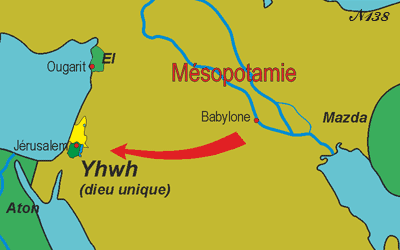
Texts written (587BC)
Return from exile 49 years later. (538BC)
Yhwh gradually becomes the only god (300BC to 100BC)
Return from exile 49 years later. (538BC)
Yhwh gradually becomes the only god (300BC to 100BC)
Little by little, the Hebrews came to believe that the gods of the other nations were false gods : « They sacrificed to demons who were not God » ( Deutéronome : 32, 17).
Like Christianity, which appeared later in reaction to the death of Jesus, a death transformed into a Resurrection, monotheism was born in reaction to a catastrophe.
And yet, although the writings collected in the Book mark the birth of monotheism, it was not until the third and second centuries BC that monotheism was definitively adopted by the Judeans! A community based at Elephantine (an island in the Nile in southern Egypt) worshipped Yahweh along with a goddess, Anat, and a third god, Ashim Bethel, until the beginning of the fourth century BC.

The evolution of the god El.
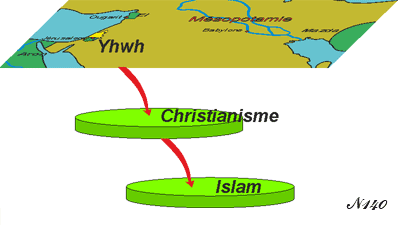
The subsequent evolution of the one god.
(*) The Bible presents King Josiah as a reformer who did everything possible to exclude any divinity other than Yhw.
https://bible.catholique.org/deuxieme-livre-des-rois/3950-chapitre-23Second Book of Kings
Chapter 23: 4-7
4 - The king ordered Helcias, the high priest, the priests of the second order and those who guarded the gate, to throw out of the temple of Yahweh all the utensils that had been made for Baal and Astarte and for all the army of heaven; and he burnt them outside Jerusalem in the fields of Kidron, and had the dust taken to Bethel.
5 - And he sent away the priests of idols, who had been made priests by the kings of Judah, to burn perfumes in the high places in the towns of Judah and round Jerusalem, and those who burned perfumes to Baal, to the sun, to the moon, to the twelve signs, and to all the army of heaven.
(**)
6 - He took the asherah out of the house of Yahweh, and carried it out of Jerusalem to the Kidron valley; he burnt it in the Kidron valley, and when it had turned to dust, he threw the dust on the graves of the children of the people.
7 - He pulled down the houses of the prostitutes which were in the house of Yahweh, where the women wove tents for Astarte.
(***)http://www.lemondedesreligions.fr/savoir/un-dieu-unique-le-rejet-d-un-ciel-trop-plein-16-04-2015-4624_110.php
Deuteronomy (6, 14-15). « You shall not go after other gods, gods of the peoples who will be around you, for Yahweh your Lord in your midst is a jealous God. »
https://fr.wikipedia.org/wiki/Culte_d%27Aton
https://fr.wikipedia.org/wiki/Zoroastrisme
https://fr.wikipedia.org/wiki/Josias
Monolatry :
Monolatry is a religious doctrine, a hierarchical form of polytheism. It recognises the existence of several gods, but worships one in preference to, or to the exclusion of, the others.
In this sense, it would be more accurate to reclassify the ‘single’ god as a ‘major’ god..
The status of women in Mesopotamia :
Assyria :
At the archaeological site of Kültepe (capital of the kingdom of Kanesh), in Turkey, clay tablets used by Assyrian merchants have revealed that women in this Mesopotamian society had the freedom and ability to act on their own.
When the merchants from the city-state of Ashur came to sell tin and cloth, the women took charge of the household : they brought up the children, weaved, sold their cloth and entered into contracts. They were autonomous, earned their own living and managed their own nest eggs.
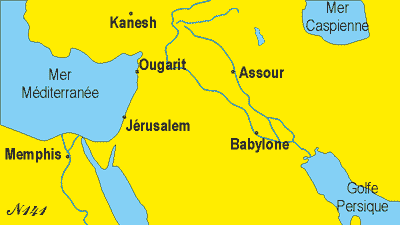
Assyrian women were very influential in daily life," points out archaeologist Cécile Michel. They had far more rights than Babylonian women, who were living in southern Mesopotamia at the same time (see below).
Among these rights, women could marry off their daughters without their husbands' consent. She could ask for a divorce in exchange for the same financial penalty as her husband. Marriage contracts provided for the separation of assets, a clause that conferred financial autonomy on the wife.
Women were also the guardians of religion and moral principles.
However, they were absent from the political arena. The city-state of Ashur was ruled by a king and an all-male assembly.
Egypt :
In ancient Egypt, too, women were equal to men : they could study, inherit, bequeath, divorce, sue for and win back household goods, and even remarry.
Few ancient civilisations allowed women to claim important social positions. Herodotus himself was surprised by the emancipation of Egyptian women, a far cry from the status of women in ancient Greece, where women were considered ‘eternal minors’.
Exceptionally in ancient and modern history, they even had access to the highest office. The most famous, Cleopatra VII (69 BC to 30 BC), is known for her relationship with Mark Antony.
Among the most famous female pharaohs are :
Nitocris (6th Dynasty),
Néférousobek (12th Dynasty),
Hatchepsout (18th Dynasty),
Ânkh-Khéperourê (18th Dynasty),
Taousert (19th Dynasty).
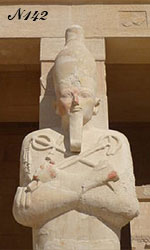
Queen Hatshepsut.
Babylon :
As in Assyria, women, especially widows, were protected : they could keep the usufruct of their dowry and the marriage gift, or they were entitled to a share of their deceased husband's inheritance, but could not be dispossessed by their children.
However, as stipulated in the Code of Hammurabi (a Babylonian legal text dating from around 1750 BC), she was subject to her husband, and her conduct as a wife was punished.
Caught in the act of adultery, her husband had the right to life or death, and the same sentence applied to his lover. However, in this case, only the king decided on the punishment, as the husband had no rights over him.
If the wife was slandered, she herself had to clear herself of the suspicion.
The status of women in early Judaism :
It is this Babylonian influence that seems to have determined the status of women in the first version of monotheism, after the return from exile. It can be found in the Talmud, where we read ‘Rather burn the Torah than entrust it to a woman’, or in certain traditional prayers ‘Blessed art Thou that Thou hast not made me a woman’ (a phrase that has now been removed from prayer books in the liberal world).
It is also found in the Gospel of John
John 8-4: They said to Jesus, "Teacher, this woman has been caught in adultery.
John 8-5: Moses, in the law, ordered us to stone such women: what are you saying then?
According to the Bible, Moses was brought up in Egypt, but did he have a Babylonian upbringing ?
Women seem to have lost their status as free women in a culture where the masculine aspect of the god has taken over.
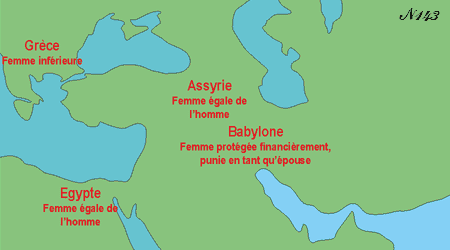
https://www.nationalgeographic.fr/histoire/il-y-4-000-ans-les-femmes-assyriennes-legal-des-hommes
https://www.lemonde.fr/decryptages/article/2016/03/04/les-femmes-au-temps-des-pharaons_4876596_1668393.html
https://fr.wikipedia.org/wiki/Place_des_femmes_dans_l%27%C3%89gypte_antique
https://fr.wikipedia.org/wiki/Code_de_Hammurabi
http://madame.lefigaro.fr/societe/judaisme-aime-t-femmes-260914-959022
Muhammad :
The founder of Islam is referred to in French as Mahomet, which derives from the Arabic Muhammad. However, this French adaptation is not without controversy, as it carries a pejorative connotation. Indeed, any proper name undergoes a phenomenon of alteration when it passes from its language of origin to a host language.
Muhammad, the Arabic first name of the prophet of Islam, which literally means ‘he who is worthy of praise’, did not escape this phenomenon when it was received by the Christian world.
What, then, is the meaning of the term ‘Mahomet’ ? It comes from ‘ma houmid’, which means ‘the unworthy of praise’.
http://www.lemondedesreligions.fr/une/de-muhammad-a-mahomet-11-07-2017-6473_115.php
http://www.lallab.org/4-raisons-darreter-dappeler-mahomet-le-prophete-de-lislam/
Voir aussi : « A propos de la forme du nom de Mahomet » Michel MASSON Université de Paris III- Sorbonne Nouvelle
www.selefa.asso.fr/files_pdf/AcBul09T02.pdf
The Gospels, the teachings of Jesus :
The first written record of the words of Jesus is said to have come down around the year 50, in a document called Source Q, which is said to contain elements common to the Gospels of Matthew and Luke. This document seems to have been a collection of the words of the man Jesus.
The second stage in the writing of the Gospels was the Gospel of Mark, around the year 70. According to Bultmann, the novelty here was the presentation of Jesus as a ‘divine man’.
The third stage was the writing of the Gospels of Matthew and Luke, around 80-85, around the same time, but in different geographical areas. Matthew and Luke did not know each other and their very similar texts suggest that they drew their information from a pre-existing source (the Q source) which has now disappeared.
The belief in the full divinity of Jesus having been affirmed, it is possible to explain why these Gospels preceded the story of his life with accounts (...) recounting an extraordinary childhood, and followed it with accounts of resurrection and apparitions, in Galilee, according to Matthew, and in Jerusalem, according to Luke, accounts attesting to his divinity.
A fourth and final stage was the writing of the Fourth Gospel by John (who is sometimes confused with John, Jesus' companion), at the end of the first century (90 to 100 AD).
https://larevuereformee.net/articlerr/n200/la-datation-des-evangiles
Money :
Today, economic inequalities mean that the 8 richest people in the world own as much as the 3.5 billion poorest.
Added to this are the misjudgements of our brain, which can give answers based on what it assumes, not on what it knows.
For example, 5,000 people questioned in the United States estimated that the difference between the salary of an unskilled worker and that of his company director was 1 to 30, whereas the difference was 1 to 350 (the boss earns in 1 day what his worker earns in 1 year).
cf : Science et Vie 1211
Tolerance and rules of conduct :
https://fr.wikipedia.org/wiki/D%C3%A9calogueBible : (Exodus 20, 2-17)
2 I am the Lord your God, who brought you out of the land of Egypt, out of the house of bondage.
3 You shall have no other gods before me.
4 You shall not make for yourself any graven image, or any likeness of anything that is in heaven above, or that is in the earth beneath, or that is in the water under the earth.
5 You shall not bow down to any gods other than me, nor serve them; for I, the Lord your God, am a jealous God, visiting the iniquity of the fathers on the children to the third and fourth generation of those who hate me.
6 But he has mercy on those who love me and keep my commandments to a thousand generations.
7 You shall not call on the name of the Lord your God in vain; for the Lord will not leave him unpunished who calls on his name in vain.
8 Remember the day of rest, to keep it holy.
9 Six days shalt thou labour, and do all thy work.
10 But the seventh day is the rest day of the Lord your God: you shall not do any work, you, nor your son, nor your daughter, your man-servant, nor your maid-servant, nor your cattle, nor your stranger who is within your gates.
11 For in six days the LORD made heaven and earth and the sea, and all that in them is, and rested the seventh day: Therefore the Lord blessed the day of rest and hallowed it.
12 Honour thy father and thy mother, that thy days may be prolonged in the land which the LORD thy God giveth thee.
13 You shall not kill.
14 You shall not commit adultery.
15 You shall not steal.
16 You shall not bear false witness against your neighbour.
17 You shall not covet your neighbour's house; you shall not covet your neighbour's wife, or his man-servant, or his maid-servant, or his ox, or his ass, or anything that belongs to your neighbour.
https://www.aelf.org/bible/Jn/15Gospels : John (15, 12-17)
12 This is my commandment : Love one another as I have loved you.
13 Greater love has no one than this, that he lay down his life for his loved ones.
14 You are my friends if you do what I say.
15 I no longer call you servants, because a servant has no knowledge of what his master is doing; I call you my friends, because all the things I have heard from my Father I have made clear to you.
16 You did not choose me, but I chose you and made you my servants, so that you might go and be fruitful and your fruit might last. So whatever you ask the Father in my name, he will give you.
17 This I command you : love one another
https://gric-international.org/2012/publications-du-gric/gric-de-paris/si-dieu-lavait-voulu-vivre-en-harmonie-avec-lautre-avec-ses-differences/Koran: (Sura 5-verse 48)
« If God had so willed, he would have made you a single community. But He wished to test you by the gift He has given you. Seek to surpass one another in good deeds. You will all return to God, and He will enlighten you about your differences ».
http://mosquees-nevers.fr/wp/blog/2016/01/12/lislam-et-le-respect-des-autres-croyances/
The lands granted to the Hebrews by Yawhe.
These certainties are at the root of three of the cruellest wars of conquest that mankind has ever endured - wars that have been waged without interruption since September 1, 1939.
These three wars are based on imaginary or real events dating back 5,000, 2,500 and 1,400 years respectively.
- The first war is based on the belief that there might have been an Aryan race ; in fact, a cultural entity that would have existed in the 3rd millennium BC, between the Caspian and Aral Seas, and would have extended its influence towards India and Europe
In the 19th century, the term Aryan was thought to refer to all Indo-European peoples.
Today, however, due to the inaccurate interpretation of this word, which designates only one language family, it is referred to as Indo-Iranian.
These Indo-Iranian languages, which developed during the Iron Age (see below *), share common roots and are related to the languages of various peoples: Latins, Celts, Slavs, Germans and Greeks.
The term “Aryan” or “Indo-European”, therefore, does not designate a people, still less a “race” (see below **), a biological classification that does not exist within the human species.
It goes without saying that assimilating a family of languages, with its thousands of variants, to a single people would enable them to arrogate rights over an immense territory.
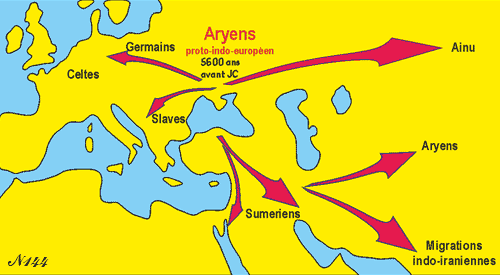
Diffusion of Indo-Iranian and its many variants.
(*) Copper Age : (000 B.C.) native copper worked at cold or low temperature.
Bronze Age : (3000 to 1000 B.C.)
Bronze is a generic name that was once given to all copper alloys. Today, its meaning is restricted to alloys of copper and tin.
Copper alloys refer to a group of alloys with a high copper content, known as cuproalloys. They generally have good corrosion resistance.
Iron Age : Began around 1100 B.C. in the Mediterranean world, around 800 to 700 B.C. in northern Europe1 and around 500 B.C. in Africa.
The addition of very small quantities of other elements considerably alters the mechanical properties of iron. When added to carbon and other elements, it forms steels
(**) It goes without saying that a difference in skin pigmentation cannot constitute a difference in "race" within the human species. What's more, current discoveries show that every human being possesses both Neanderthal and Denisovian DNA in his or her genome, demonstrating the permanent interbreeding of different human populations, each bringing its own adaptive advantages, along with its own culture.
In fact, the term "breed" is rarely used in scientific language, as it is not relevant to designate categories. It is only used for domesticated animal species with artificially selected characteristics (dogs, cats, farm animals, etc.).
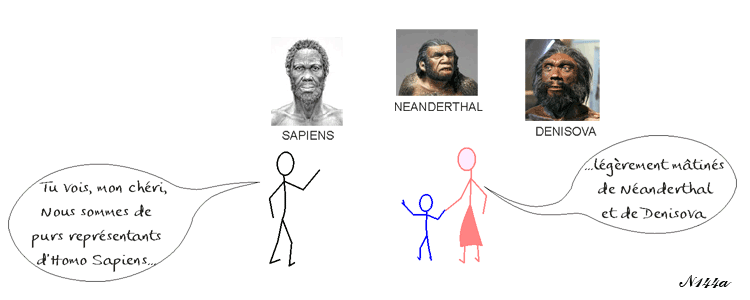
- The war that immediately succeeded it is today motivated by the annexation by a people of a territory said to have been granted by a god 2,500 years ago. Based on what sources ?
The geographical definition given by the Bible is extremely variable (see below : ****The gifts of land by yhwh in the Book) : certain biblical texts attribute simple living quarters to characters (Ge 28), others attribute more extensive territories to them (Ge12,17,26), echoing the terms undoubtedly used by Cyrus when he granted the Judeans the right to return to their lands.
Other texts specify no limit to the territories granted (Ge13), or give them a territory stretching from “the river of Egypt to the river of Euphrates” (Ge15), i.e. the entire Assyrian kingdom under Assurbanipal, after he had defeated the Egyptians in 568 BC..
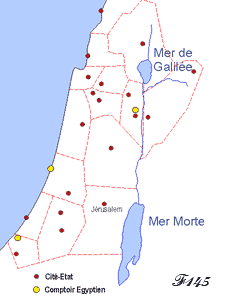
City-states between the Jordan and the Mediterranean.
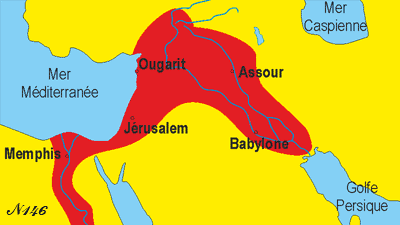
The Assyrian kingdom under Assurbanipal.
- Finally, the last war, was intended to restore the Abbasid caliphate, which had disappeared 13 centuries earlier.
This Sunni caliphate ruled the Muslim world from 750 to 1258. It disappeared with the destruction of Baghdad by the Mongols in the 13th century.
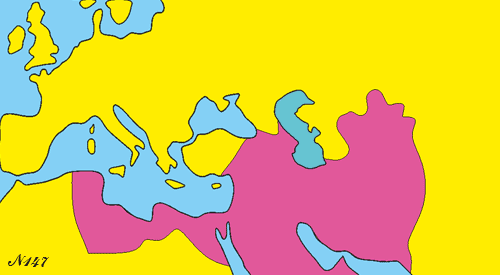
The Abbasid caliphate at its greatest extent, at the end of the 8th century.
https://fr.wikipedia.org/wiki/Aryens
https://fr.wikipedia.org/wiki/Arthur_de_Gobineau
L'Essai sur l'inégalité des races humaines
https://www.histoire-pour-tous.fr/dossiers/5491-les-aryens-une-histoire-europeenne-et-indienne.html
https://fr.wikipedia.org/wiki/Terre_d%27Isra%C3%ABl
https://fr.wikipedia.org/wiki/Califat_abbasside
(****) The gifts of land by yhwh in the Book :
Genesis 12
6: Abram went through the land as far as the place called Shechem, as far as the oaks of Moreh. The Canaanites were then in the land.
7 : The Lord appeared to Abram and said, "I will give this land to your descendants.
6: Abram went through the land as far as the place called Shechem, as far as the oaks of Moreh. The Canaanites were then in the land.
7 : The Lord appeared to Abram and said, "I will give this land to your descendants.
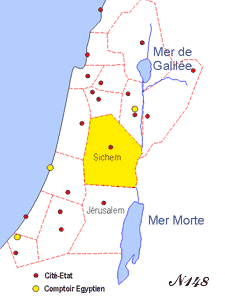
Genesis 13.
1 Abram went up from Egypt to the south
2 Abram was very rich in flocks, silver and gold.
3 He directed his steps from the south to Bethel, to the place where his tent was at the beginning, between Bethel and Ai,
4 to the place where the altar he had made previously was. And there Abram called on the name of the Lord.
(...)
14 And the Lord said to Abram, after Lot had departed from him: Lift up your eyes, and look from your place (*) northward and southward, eastward and westward;
15 for all the land you see I will give to you and to your descendants forever. (indicates the region where one lives)
(*) For a man whose eyes are 1.73 meters above the edge of the sea, the horizon is about 4,700 m (4.7 km). This gift (about 78 km2) therefore seems to concern the valley where a nomadic chief has just arrived, and where he will be able to set up his tribe.1 Abram went up from Egypt to the south
2 Abram was very rich in flocks, silver and gold.
3 He directed his steps from the south to Bethel, to the place where his tent was at the beginning, between Bethel and Ai,
4 to the place where the altar he had made previously was. And there Abram called on the name of the Lord.
(...)
14 And the Lord said to Abram, after Lot had departed from him: Lift up your eyes, and look from your place (*) northward and southward, eastward and westward;
15 for all the land you see I will give to you and to your descendants forever. (indicates the region where one lives)
http://villemin.gerard.free.fr/aScience/Physique/OPTIQUE/Horizon.htm
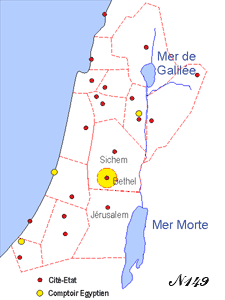
Genesis 17.
5 You shall no longer be called Abram, but your name shall be Abraham, for I have made you the father of a multitude of nations.
8 I will give you, and your descendants after you, the land you live in as a foreigner, all the land of Canaan, for a perpetual possession.
5 You shall no longer be called Abram, but your name shall be Abraham, for I have made you the father of a multitude of nations.
8 I will give you, and your descendants after you, the land you live in as a foreigner, all the land of Canaan, for a perpetual possession.
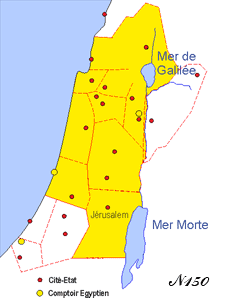
Genesis 26.
1 Now there was a famine in the land—besides the previous famine in Abraham’s time—and Isaac went to Abimelek king of the Philistines in Gerar.
2 The Lord appeared to Isaac and said, “Do not go down to Egypt; live in the land where I tell you to live.
3 Stay in this land for a while, and I will be with you and will bless you. For to you and your descendants I will give all these lands and will confirm the oath I swore to your father Abraham.
4 I will make your descendants as numerous as the stars in the sky and will give them all these lands, and through your offspring[a] all nations on earth will be blessed,
5 because Abraham obeyed me and did everything I required of him, keeping my commands, my decrees and my instructions.”
6 So Isaac stayed in Gerar.
1 Now there was a famine in the land—besides the previous famine in Abraham’s time—and Isaac went to Abimelek king of the Philistines in Gerar.
2 The Lord appeared to Isaac and said, “Do not go down to Egypt; live in the land where I tell you to live.
3 Stay in this land for a while, and I will be with you and will bless you. For to you and your descendants I will give all these lands and will confirm the oath I swore to your father Abraham.
4 I will make your descendants as numerous as the stars in the sky and will give them all these lands, and through your offspring[a] all nations on earth will be blessed,
5 because Abraham obeyed me and did everything I required of him, keeping my commands, my decrees and my instructions.”
6 So Isaac stayed in Gerar.
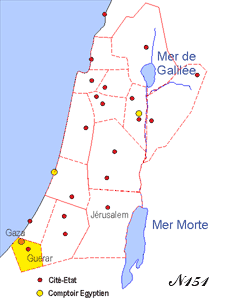
Genesis 28.
10 Jacob left Beer-Sheba and went to Haran (northern Mesopotamia).
12 He had a dream. And behold, a ladder stood upon the earth, and the top of it reached to heaven. And behold, the angels of God were ascending and descending by this ladder.
13 And behold, the Lord stood above it and said, "I am the Lord, the God of Abraham your father and the God of Isaac. The land on which you lie, I will give to you and to your descendants.
10 Jacob left Beer-Sheba and went to Haran (northern Mesopotamia).
12 He had a dream. And behold, a ladder stood upon the earth, and the top of it reached to heaven. And behold, the angels of God were ascending and descending by this ladder.
13 And behold, the Lord stood above it and said, "I am the Lord, the God of Abraham your father and the God of Isaac. The land on which you lie, I will give to you and to your descendants.
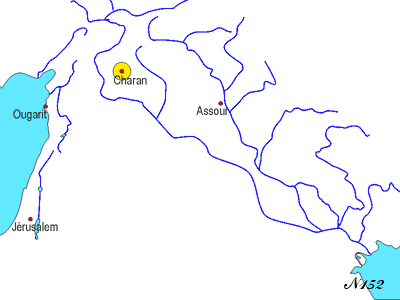
Genesis 35.
6 Jacob came, he and all who were with him, to Luz, which is Bethel, in the land of Canaan. 7 He built an altar there, and called the place El-Bethel; for it was there that God had revealed Himself to him when he fled from his brother
9 God appeared to Jacob again, after he had returned from Paddan-Aram, and blessed him.
12 I will give you the land that I gave to Abraham and Isaac, and I will give this land to your descendants after you.
6 Jacob came, he and all who were with him, to Luz, which is Bethel, in the land of Canaan. 7 He built an altar there, and called the place El-Bethel; for it was there that God had revealed Himself to him when he fled from his brother
9 God appeared to Jacob again, after he had returned from Paddan-Aram, and blessed him.
12 I will give you the land that I gave to Abraham and Isaac, and I will give this land to your descendants after you.

Numbers 33 :
50 The Lord said to Moses in the plains of Moab, near the Jordan, opposite Jericho:
51 "Pass on these instructions to the Israelites: When you have passed the Jordan and entered the land of Canaan,
52 you shall drive out before you all the inhabitants of the land. You shall destroy all their idols made of stone and molten metal, and remove all their high places.
53 You shall take possession of the land and settle there, for I have given you this land to possess.
Numbers 34 :
1 The Lord said to Moses:
2 Command the Israelites as follows: When you have entered the land of Canaan, this land will become your inheritance. This is the land of Canaan, whose boundaries are as follows.
3 The south side will begin at the desert of Zin near Edom. Thus, your southern border will start from the end of the Dead Sea in the east.
4 It will turn south from the ascent of Akrabbim, pass through Zin and extend to the south of Kadesh-Barnea. It shall continue by Hazar-addar and pass towards Atzmon.
5 From Atzmon it shall turn to the torrent of Egypt and end at the sea.
6 Your western border shall be the Mediterranean Sea: this shall be your western border.
7 This shall be your northern border: from the Mediterranean you shall trace it to Mount Hor;
8 from Mount Hor you shall trace it to Hamath and come to Zedad.
9 It will continue through Ziphron to Hazar-enan: this will be your northern border.
10 You will draw your eastern border from Hazar-enan to Shepham.
11 It will go down from Shepham to Riblah, east of Ain. And it shall go down and spread out along the lake of Gennesaret to the east.
12 And it shall go down to the Jordan to the Dead Sea. This will be your land, with its borders all around.
Deuteronomy 11
23 The Lord will drive out all these nations from before you, and you will make yourselves masters of nations greater and more powerful than you.
24 Every place where the sole of your foot treads shall be yours: your border shall extend from the wilderness to Lebanon, and from the river Euphrates to the western sea.
25 No one shall stand against you. The Lord your God will spread fear and dread of you over all the land where you walk, as he has told you.
50 The Lord said to Moses in the plains of Moab, near the Jordan, opposite Jericho:
51 "Pass on these instructions to the Israelites: When you have passed the Jordan and entered the land of Canaan,
52 you shall drive out before you all the inhabitants of the land. You shall destroy all their idols made of stone and molten metal, and remove all their high places.
53 You shall take possession of the land and settle there, for I have given you this land to possess.
Numbers 34 :
1 The Lord said to Moses:
2 Command the Israelites as follows: When you have entered the land of Canaan, this land will become your inheritance. This is the land of Canaan, whose boundaries are as follows.
3 The south side will begin at the desert of Zin near Edom. Thus, your southern border will start from the end of the Dead Sea in the east.
4 It will turn south from the ascent of Akrabbim, pass through Zin and extend to the south of Kadesh-Barnea. It shall continue by Hazar-addar and pass towards Atzmon.
5 From Atzmon it shall turn to the torrent of Egypt and end at the sea.
6 Your western border shall be the Mediterranean Sea: this shall be your western border.
7 This shall be your northern border: from the Mediterranean you shall trace it to Mount Hor;
8 from Mount Hor you shall trace it to Hamath and come to Zedad.
9 It will continue through Ziphron to Hazar-enan: this will be your northern border.
10 You will draw your eastern border from Hazar-enan to Shepham.
11 It will go down from Shepham to Riblah, east of Ain. And it shall go down and spread out along the lake of Gennesaret to the east.
12 And it shall go down to the Jordan to the Dead Sea. This will be your land, with its borders all around.
Deuteronomy 11
23 The Lord will drive out all these nations from before you, and you will make yourselves masters of nations greater and more powerful than you.
24 Every place where the sole of your foot treads shall be yours: your border shall extend from the wilderness to Lebanon, and from the river Euphrates to the western sea.
25 No one shall stand against you. The Lord your God will spread fear and dread of you over all the land where you walk, as he has told you.
The approximate extension of the Babylonian Empire under the reign of Nabonidus (556-539 BC). |
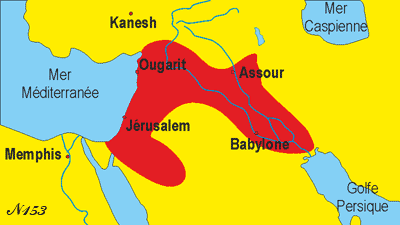 |
Numbers 33
Genesis 15
18 On that day, the Lord made a covenant with Abram, saying: "I give this land to your descendants, from the River of Egypt to the great river, the River Euphrates,
Genesis 15
18 On that day, the Lord made a covenant with Abram, saying: "I give this land to your descendants, from the River of Egypt to the great river, the River Euphrates,
The approximate extent of the Assyrian Empire under the reign of Assurbanipal (-668 -627).. |
 |
https://saintebible.com/
Of course, while some gifts seem to be the result of a god's benevolence (Ge 12), others refer more to the alliance established between an all-powerful emperor and a tribal chief (Ge 15, Ge 17), or even to the order that a sovereign may give to his troops to conquer a land beyond the Jordan (Numbers 33).
For all these reasons, it seems very difficult to attribute all these disparate texts to a single god, or else a very fickle god, more inclined to satisfy the whims of men, even inciting them to murderous conquests with little respect for the 10 words, when the latter should have prevailed.
